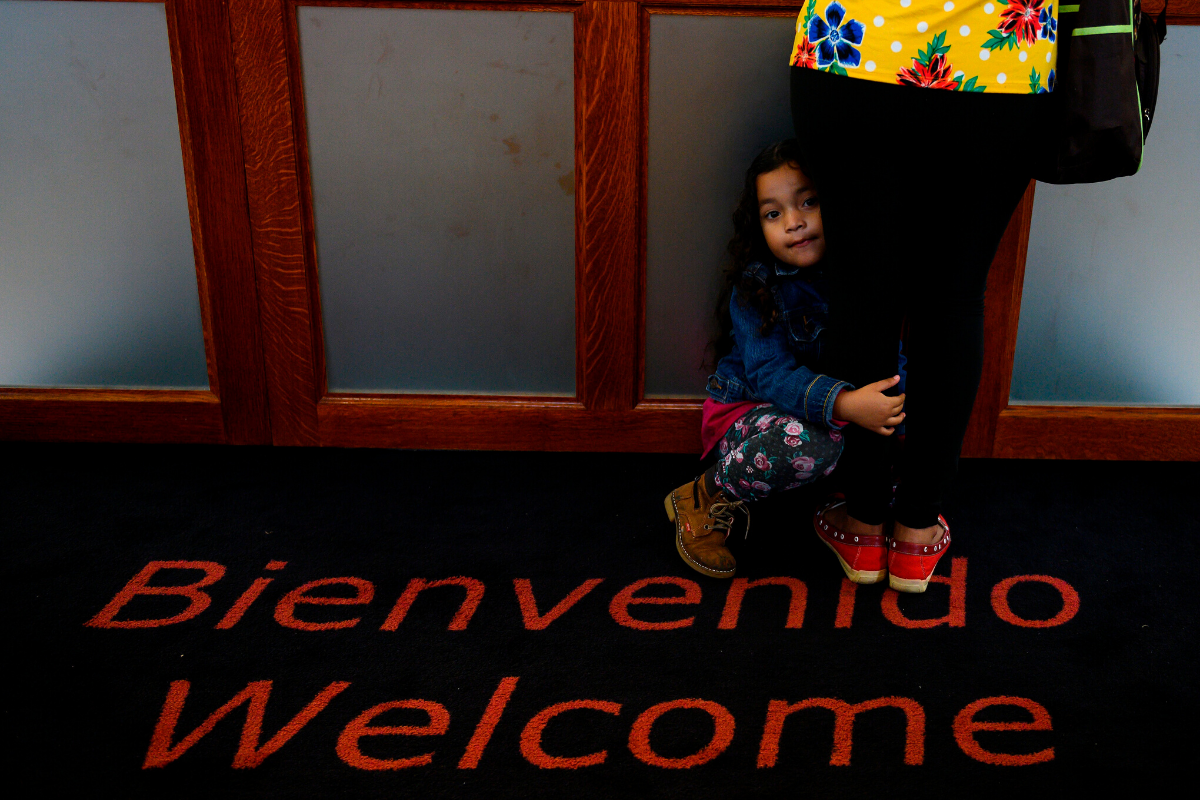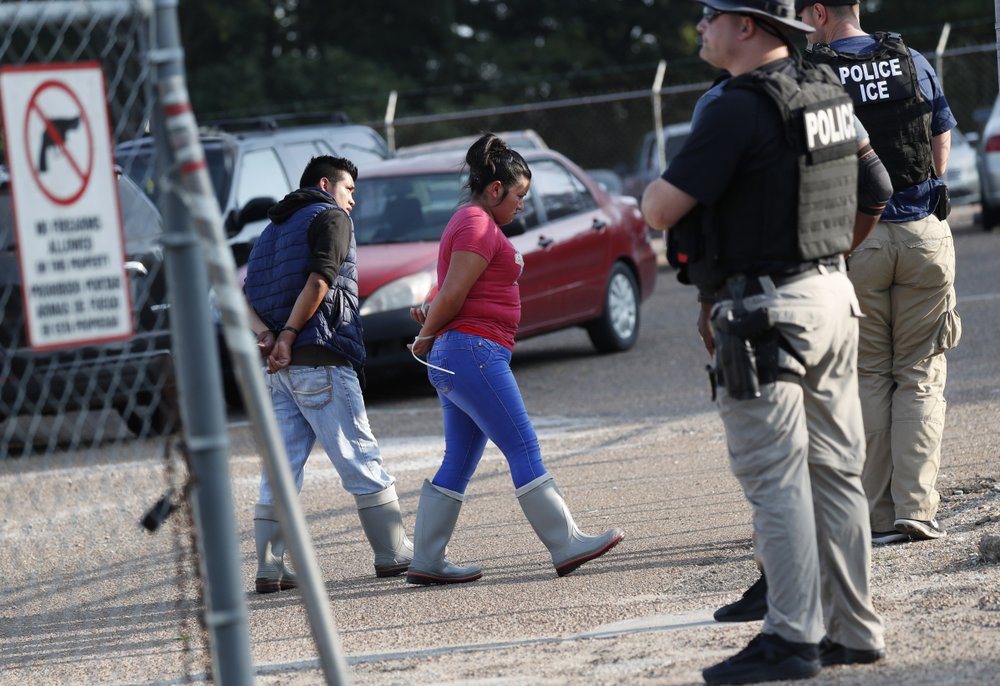

Photo by ANDREW CABALLERO-REYNOLDS/AFP via Getty Images
JACKSON, Mississippi — If you live in a major city, you’re probably used to seeing signs, local news channels, menus, and other services in various languages. Don’t take that for granted.
Rural states like Mississippi have small immigrant communities, and since most people find ways to learn English or keep to themselves, the medical, legal, and business sectors rarely consider language justice as a part of their services or strategy.
Undocumented immigrants who are limited English proficient (LEP) not only have to deal with stigma, xenophobia, and decreased access to many aspects of public life, but are also on their own when it comes to finding interpreter services, even though it’s actually available.
Mississippi Rarely Has Translators Available
Communications in languages other than English, including American Sign Language, are in short supply in Mississippi. Even immigrant rights nonprofits or immigration lawyer offices may not have staff members who speak languages other than English, or they may not have everything they need to help immigrants on a more holistic level.
Doctors, dentists, and optometrist offices rarely have bilingual staff, or practice using telemedicine options that can help them find interpreters over the phone. I learned about interpretation and translation services a few months ago when I asked a nursing instructor friend to describe her experiences working with interpreters, translators, and the tools they use to communicate with patients that are limited English proficient (LEP). That was the first time I learned about protections that can help immigrant communities get the care they deserve.
Children of Immigrant Parents Still Translate For Them
Friends, classmates, and colleagues have talked to me about their experiences translating for their parents in medical settings. Not only is this difficult for children and teens who are put in this position, it could lead to unresolved health issues due to mistakes in translation. Children, teens, and uncertified translators aren’t equipped to communicate complex medical information.
In addition, children of immigrants often learn delicate health information about their parents that they may not be able to handle. If help is available, then why is it that so many immigrants and LEP patients still ask a relative, friend, or trusted person to interpret for them?
All LEP and deaf or hard of hearing patients need extra help, but undocumented immigrants are the most vulnerable group of all. Experts believe that undocumented folks may even refuse to seek health care because they’re afraid of having to disclose their immigration status.
But in our new world, we need to consider that COVID-19, a disease caused by an infectious virus that is now present in almost all corners of the globe, doesn’t discriminate. Access to help in a language that people can understand is crucial to protecting our immigrant community. The sad thing is that Mississippi already has several tools in place to make this happen, but it won’t use them to their fullest extent or at all. This isn’t always the fault of community health clinics or local hospitals—the lack of language justice is complex.
Resources Are Under-Utilized and Under-Marketed
Last year, I had the opportunity to ask a nursing instructor about her experiences. According to her, communicating with patients was always best with an interpreter present. COVID-19 possibly rules this option out, and rural hospitals often rely on employees who work limited hours and may only work on-call. The lack of job security associated with these types of working conditions means that bilingual people are less likely to want to offer their skills to local hospitals.
Mississippi’s immigrant population is also small enough that doctors, nurses, and other medical professionals such as dentists, optometrists, radiologists, and others simply don’t encounter language communication issues enough to feel that it’s an urgent need.
Without the proper information or knowledge, some patients actually hire interpreters that charge them exorbitant hourly fees. I know this because I’ve had several gig offerings from community members, though I rejected these because my writing kept me busy. Some people offered as much as $50 per hour, and though it was tempting, a part of me knew that I, a bilingual writer who lived in South America, wasn’t 100% equipped for this type of work. I’m only equipped to consult on gaps in service, and then make recommendations for how local, state, and private organizations can make concrete changes.
The good news is that some of the state’s largest hospitals, such as the University of Mississippi Medical Center (UMMC) and North Mississippi Health Services (NMHS) actually provide language and interpretation assistance. It takes some digging to find this information, and few patients are aware that these services are not only provided, but protected by the national Civil Rights Act of 1964, which makes it illegal to discriminate against anyone due to their national origin.
Residents should also know that Mississippi only works with registered medical interpreters who have passed a given course. This is actually a good thing because it ensures that the person mediating between a doctor and patient is qualified to do the job. Unfortunately, patients and medical staff seem to have had little practice using the current tools that are available, and some are unaware that these tools exist at all.
Most Undocumented People Can’t Work From Home
Quarantining, social distancing, and practicing good health habits are the best way to prevent a COVID-19 infection, but staying home is a major obstacle for Latinxs and other immigrant groups. The dirty reality of the U.S. economy is that undocumented workers are far more essential than most people give them credit for. Even in Trump country, immigrants often work in farms, chicken plants, assembly line positions, and even the furniture industry.
For workers in Mississippi, things aren’t looking good as Governor Tate Reeves refused to put the state on lockdown even after a recent trip to Spain, and his objection to Medicaid expansion during his 2019 electoral campaign is now scrutinized.
It doesn’t help that a 2019 study found 31 of Mississippi hospitals are at risk of financial collapse, which could cause their closures. The Mississippi State Department of Health official website has crucial information about the COVID-19 response (including testing sites) in English only. The information provided in Spanish, Vietnamese, and ASL is generic at best, and isn’t enough to help immigrants and LEP patients stay on top of local statistics that could keep them informed and prevent infection.


Two people are apprehended at a Koch Foods Inc. plant in Morton, Miss., on Wednesday, Aug. 7, 2019. (AP Photo/Rogelio V. Solis).
What Activists Are Doing
Mississippi’s immigrants got the country’s attention last year when the largest immigration raid of the decade resulted in nearly 700 arrests. Groups such as Mississippi Resiste are asking for Congressman Bennie Thompson to support a statewide release of ICE detainees because of the COVID-19 outbreak, some of whom were affected by the 2019 raids. Though their release won’t solve the linguistic barrier some detainees may face, leaving detention centers will allow them to practice social distancing— crucial to flattening the curve and impossible to do in prison.
As I dug around and tried to find people who could discuss the implications of language justice in Mississippi and our current pandemic, I ran into more questions than answers.
What will happen to nurses with Deferred Action for Childhood Arrivals (DACA) who are still awaiting the Supreme Court ruling on the constitutionality of that program? What about the many engineers that could help local companies find ways to make ventilators and other essentials? What will be done about deportations that could endanger deportees, flight crew, and even U.S.-based staff and put them at risk of contracting COVID-19?
As it is, most translation and interpretation of news stories is very grassroots. Activists, organizers, and caring individuals sometimes read a story and try to summarize its most important components. Local pastors are stepping up and canceling church services, but this leaves out the many people who don’t know individuals doing the work. Language justice isn’t just about ensuring that there are interpreters and translators who can help doctors and patients communicate during this pandemic and other medical issues, it means letting the public know about them so they can be utilized and be considered for additional funding.
Perhaps Mississippi never had language justice, but now is the time for the state to step up for immigrant rights, especially as it relies on immigrants and people of color to maintain its most essential businesses, and when most stimulus packages will leave the state’s most vulnerable citizens out of any possible checks or any kind of economic aid.
***
Ingrid Cruz is the owner/creator of #NadaPhotographyProject. She is based in Mississippi and tweets from @ingridiswriting.



why would you want to live in Mississippi?
why wouldn’t you learn the language